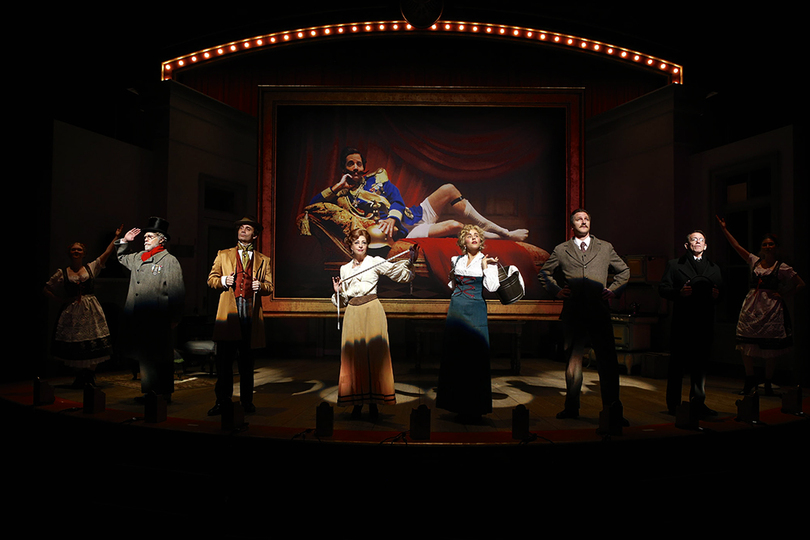Syracuse Stage’s rendition of ‘The Underpants’ is a racy story of sexual frustration

Syracuse Stage's rendition of Steve Martin’s "The Underpants" will run until Nov. 8. Courtesy of Michael Davis
In the first few minutes of the “The Underpants,” those in the front row took a bucket of confetti directly to the face. Things only escalated from there.
Syracuse Stage opened Steve Martin’s “The Underpants” on Oct. 23. Originally adapted from a 1910 German farce, the play tells the story of a sexually frustrated, married woman, Louise Maske, whose panties accidentally fall down around her ankles at a parade for the king. The show will be at Syracuse Stage through Nov. 8.
Known for directing the hits “Hairspray” and “A Midsummer Night’s Dream,” director Bill Fennelly slips back into Syracuse Stage for a third time. His concept for the play captures the duality of a “wild comedy linked with realness,” Fennelly said. Comparing the mundane reality of these middle-class characters to the classic sitcom “The Honeymooners,” Fennelly attempted to balance the reality of marriage with the German, hyper-theatrical style of the play.
Fennelly used the lighting to accentuate the split between the two main aspects of the play. At the end of each act, lights went purple, German music played and the beer hall girls danced around stage moving the props for the next scene.
“Changing the lighting showed the clear distinction of the abstract, clown version of the world. When lights transformed back to normal, it showed a transition back into the normal world,” said McKenna Batterson, a sophomore musical theater major.
From tip to end, “The Underpants” bursts with sexual innuendo, suggestive puns and physical comedy. Every actor speaks in either a thick German or Italian accent. Each performer put exaggerated spin on each of their character’s movements.
The hyperbolic movement got the biggest reactions from the audience when combined with sexy wit.
“The innuendo paired with the physical comedy helped jokes from falling flat. Movement-based comedy mixed with wit is always very strong,” Batterson said.
Marianna McClellan, who portrays Louise, played another sexually inhibited woman in her last role at Syracuse Stage in “In the Next Room.” She said the primary difference between those roles largely had to do with physical comedy displayed by every character in “The Underpants.”
“All impulses you had to extend to a place of ridiculousness,” McClellan said.
Former Cirque du Soleil clown, Daniel Passer, played Versati, an Italian poet who becomes infatuated with Louise. Attempting to break the barrier between the audience and himself, Passer said he calculated each of his movements to find what worked. Every entrance is an introduction and every exit is his signature, a sharp pivot with arms clenched tightly in a running position out the stage door.
A man walking with a top hat over his lap sees the beer hall girls prancing around, and the hat begins to rise up like the flags beside him. This type of comedy got roars from the audience, but was completely lacking subtlety. This style of jokes faired well with the mostly forty-and-older crowd that packed the theater.
When adapting this play, actor and comedy, Steve Martin aimed to deny the norm of a punch line. Instead, “The Underpants” just keeps coming with every dirty gesture and sexual insinuation possible.
Yet, although the jokes landed fairly timely, it was rare to laugh out loud. Perhaps living a generation already saturated with sex, the show’s often clever but obvious humor loses its shock value with millennials.




